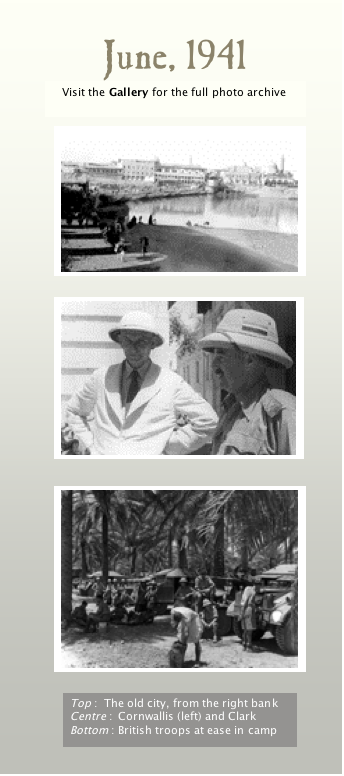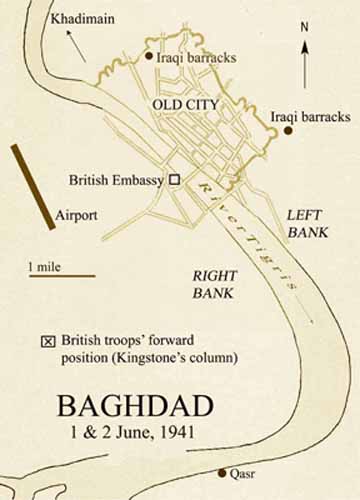Farhud
Gallery
 IN 1941, suddenly, the harmony that had characterised neighbourly relations between the Jews and the Muslim majority in Iraq for decades, if not generations, evaporated when Nazi sympathisers overthrew the government. The rise of Rashid Ali al-Gaylani was backed by a sinister cleric who was Britain’s Most Wanted — the Grand Mufti of Jerusalem, Haj Amin al-Husseini, who had been wreaking havoc in Palestine with a campaign of terrorism against Jewish and British targets. It was a significant development no one in the community could ignore.
IN 1941, suddenly, the harmony that had characterised neighbourly relations between the Jews and the Muslim majority in Iraq for decades, if not generations, evaporated when Nazi sympathisers overthrew the government. The rise of Rashid Ali al-Gaylani was backed by a sinister cleric who was Britain’s Most Wanted — the Grand Mufti of Jerusalem, Haj Amin al-Husseini, who had been wreaking havoc in Palestine with a campaign of terrorism against Jewish and British targets. It was a significant development no one in the community could ignore.
Britain was on the back foot in World War II. It was losing to Germany in Greece and North Africa, suffering horrendous casualties in the Blitz and both men and material in U-boat attacks on shipping in the North Atlantic. Rashid Ali seized the moment to take sides with Berlin and deny the British the oil supplies that were vital to her war effort (the navy depended on them totally in the Mediterranean). He dispatched a force to threaten the RAF desert airbase at Habbaniya, west of Baghdad, and laid seige to the British Embassy in whose grounds some 300 terrified expatriates (among them the distinguished writer, Freya Stark) took shelter for a month. An air war raged, with cadet pilots bravely flying sortie after sortie in ancient biplanes against Iraqis in modern aircraft. It would later be hailed as the Second Battle of Britain, though their bravery has gone unrecognised.
Furious, Churchill ordered an immediate invasion to effect regime change, even though it probably meant having to engage Hitler’s forces in yet another theatre of war. Luckily, however, Berlin was slow to respond to Baghdad’s calls for assistance. The RAF fought and won a brilliant battle that has been virtually forgotten by military historians, and the invading troops crossed 600 miles of desert with orders to enter and recapture Baghdad. After a historic march a forward column led by Brigadier Joe Kingstone arrived at the city gates — and halted.
revealed: the truth behind the killings
It was a stunning achievement against great odds. But three miles from their objective, their orders had unexpectedly changed. Although victory was theirs, for they had created a stranglehold on the city and the tyrant had fled, the triumph was deliberately muffled. Extraordinarily, one man, British Ambassador Sir Kinahan Cornwallis, had been granted the right of final decision over military as well as diplomatic matters — and the steps that he took meant no British soldier set foot in the city while the Jews were being killed in their hundreds over the two days of mayhem.
 The troops, led by the Household Cavalry, were obliged to camp on the right bank of the Tigris, well outside the city, while the left bank erupted in violence. Cornwallis — safe in his embassy on the right bank, facing the riot zone in the Old City across the river — refused pleas by his own senior staff to call them in, and they were powerless to act. Frustrated, they remained at ease in their bivouac beneath the palm trees. The senior commander, Major-General George Clark, entered the city as the ambassador’s guest only once the rioting was over — quelled by Iraqi soldiers.
The troops, led by the Household Cavalry, were obliged to camp on the right bank of the Tigris, well outside the city, while the left bank erupted in violence. Cornwallis — safe in his embassy on the right bank, facing the riot zone in the Old City across the river — refused pleas by his own senior staff to call them in, and they were powerless to act. Frustrated, they remained at ease in their bivouac beneath the palm trees. The senior commander, Major-General George Clark, entered the city as the ambassador’s guest only once the rioting was over — quelled by Iraqi soldiers.
The events of 1 and 2 June had apocalyptic implications for the descendants of Abraham: nothing short of the termination of 2,600 years of Jewish settlement in the land of Babylon. Yet strangely, the shameful role played by the British has never been properly investigated or explained and has forever remained an enigma, perplexing Iraqi Jews the world over.
Now, in a final section of Memories of Eden, my husband (a former London Sunday Times journalist) exposes the truth behind the fateful events of 1941, shedding new light on the British stand and the diplomatic fiasco behind it.
